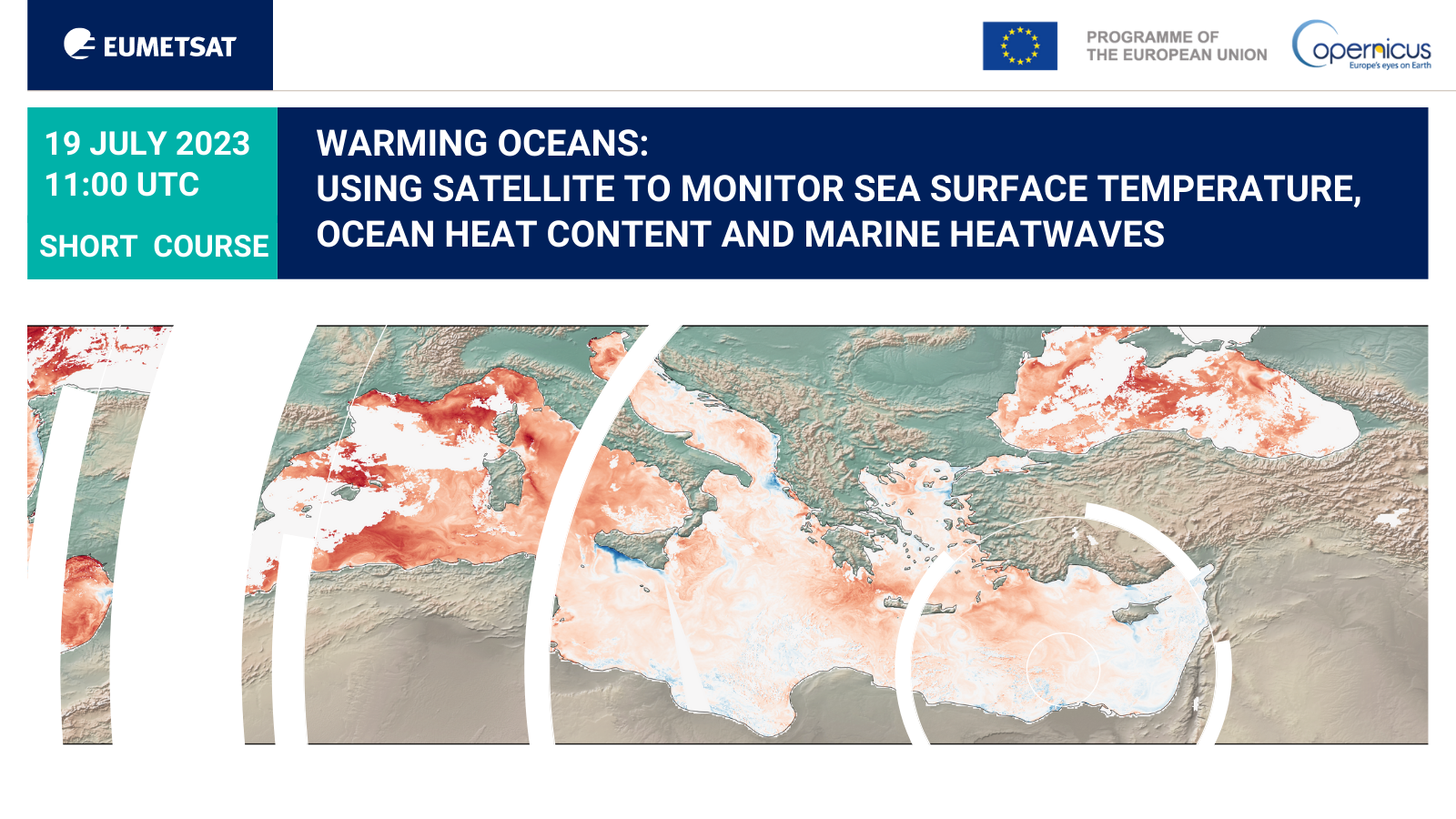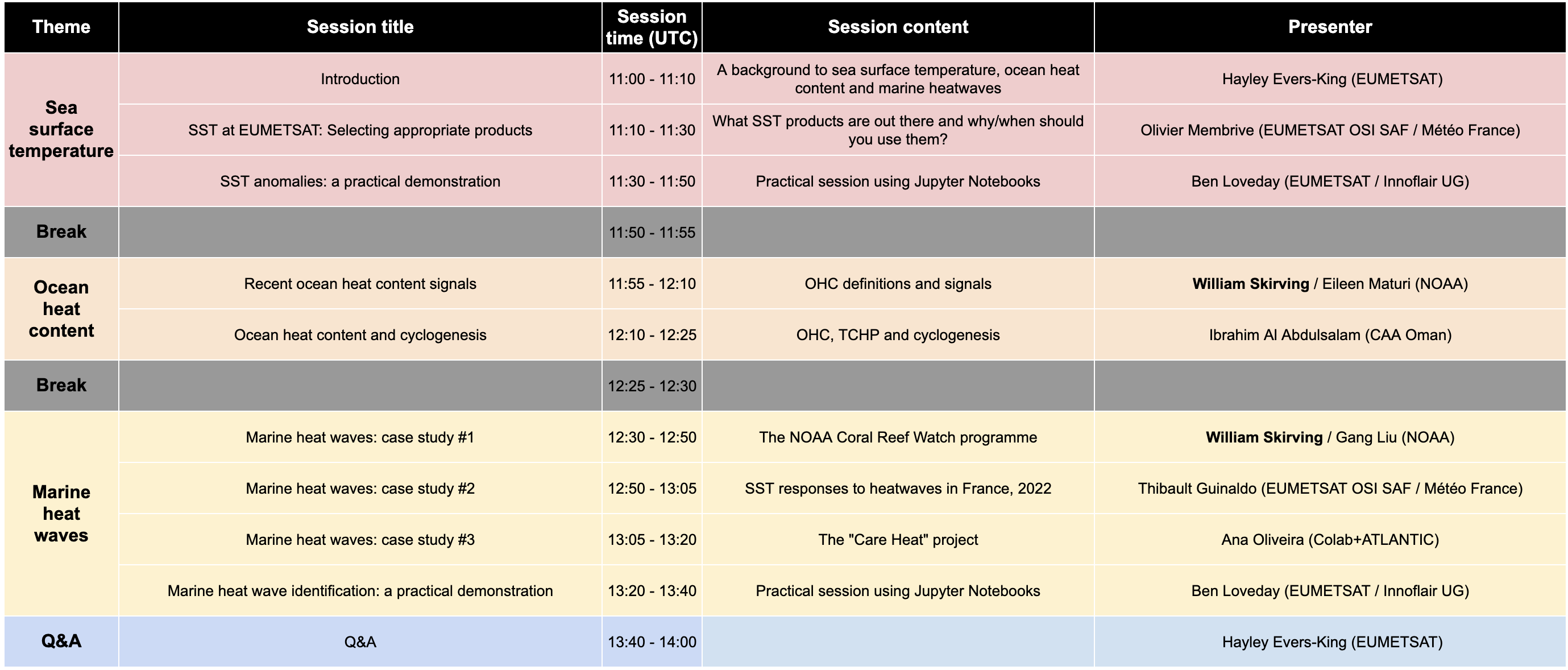Short_course_42_Warming oceans: using satellite to monitor sea surface temperature, ocean heat content and marine heatwaves
Section outline
-
Warming oceans: using satellite to monitor sea surface temperature, ocean heat content and marine heatwaves

Webinar with Hayley Evers-King, EUMETSAT, Olivier Membrive, Météo France / EUMETSAT OSI SAF, Thibault Guinaldo, Météo France, Ben Loveday, EUMETSAT, Ana Oliveira, +ATLANTIC CoLAB, William Skirving, NOAA CoralReef Watch, Ibrahim Al Abdulsalam, CAA Oman.
19 July 2023, 11:00 UTC
This advanced event will focus on the application of satellite sea surface temperature (SST) measurements to several current applications including ocean heat content, cyclogenesis, and marine heatwaves. It will present some technical background on how products are derived, and how to select the most suitable products for different applications.
A practical demonstration will show the calculation of SST anomalies and marine heatwave indicators. Leading experts will then present the use of SST and derived products for research applications, and what this data is telling us about the current status of heat in different ocean regions.
The short course will consist of a 3-hour webinar on July 19th (11:00 - 14:00 UTC), which will include a Q&A and feedback session. To support participants in using the data sets and tools we highlight, we will keep the online Q&A platform open for one week following the webinar, responding quickly to any queries posted.
Target audience:
- Established and early career sea surface temperature researchers.
- Operational oceanographers.
- Private and public sector specialists engaged in marine monitoring activities.
- Previous attendees of EUMETSAT Supporting Marine Applications courses that focussed on sea surface temperature applications.
Expected outcomes
- Understand the links between sea surface temperature, ocean heat content, and marine heat waves.
- Know how to access SST data.
- Understand how and when to use different types of SST products and data records.
- Be able to calculate SST anomalies.
- Be aware of the current status of ocean temperatures, heat content, marine heatwaves, and their impacts.
Agenda:
The webinar will be broken into three sections focussed on sea surface temperature data records and their usage, ocean heat content and marine heatwaves. The full agenda of sessions and speakers can be found below:

-
We'll meet you on Zoom Webinar
Zoom is a web-based video conferencing tool with a local, desktop client and a mobile app that allows us to meet online.
You do not need an account to join the session. To join, simply click the link provided when registering. (Troubles joining?)Here are a few tips you may consider:
- For better audio quality, please prepare a headset with a microphone.
- Join 5-10 minutes early to test your audio. Here is how to do it.
- Use your real name.
Need help in Zoom?
We want to make sure you get support when you need it. During the session, please use the Chat window and select Send to: Support to send a message to our colleagues who can help you.
Your questions on Slido.com
During the webinar, we will be using Slido to answer your questions. Go to Slido.com and use #EUMSC42 or click here. No log in required. You can join Slido from your phone.
-
We will demonstrate two Jupyter Notebooks during the practical parts of the demonstration. These notebooks can be cloned from our ocean-case-study repository, which can be found in the ocean training group of our GitLab page (eumetlab)
We will focus on the Sea surface temperature anomalies in the Northern Atlantic and Mediterranean Sea in 2023 and Marine heatwaves in the Mediterranean Sea in 2023 notebooks, both of which can be accessed via the Index notebook at the URL above.Attendees may also be interested in our learn-slstr and learn-osi-saf-winds repositories, which contains information on working with EUMETSAT Copernicus and OSI SAFE SST products:
- https://gitlab.eumetsat.int/eumetlab/oceans/ocean-training/sensors/learn-slstr
- https://gitlab.eumetsat.int/eumetlab/oceans/ocean-training/sensors/learn-osi-saf-sst
Presentations:
- Introductory presentation, H. Evers-King, EUMETSAT
- SST at EUMETSAT: selecting appropriate product, O. Membrive, Météo France/EUMETSAT OSI SAF
- NOAA Ocean Heat Content product, W. Skirving, NOAA
- Ocean Heat Contents and Cyclogenesis, I. Al Abdulsalam, CAA Oman
- Marine Heat Waves case study: NOAA Coral Reef Watch, W. Skirving, NOAA
- Response of the sea surface temperature to heatwaves during the France 2022 meteorological summer, T. Guinaldo, Météo France
- CAREHeat: detection and threats of marine heatwaves, A. Oliveira, +ATLANTIC CoLAB
video by +ATLANTIC CoLAB, shown during the presentation
Recording:
- https://gitlab.eumetsat.int/eumetlab/oceans/ocean-training/sensors/learn-slstr
-
Our training activities support users in the member states and among the World Meteorological Organization (WMO) members in the application of EUMETSAT data, products, and services, including Copernicus data provided by EUMETSAT. Find our more at our web page.
Subscribe to the Training Bulletin the joint EUMETSAT, EUMETCAL, EUMeTrain newsletter on new activities and resources in European meteorological training — published every quarter.
Contact us for questions about training events and professional development opportunities at training@eumetsat.int.
Follow us on Twitter @eumetsat_users.
